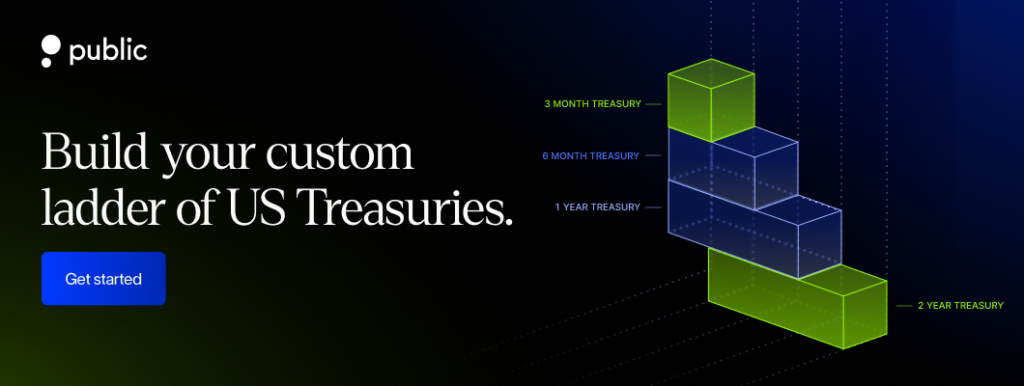Treasury bonds, a type of Treasury marketable securities, are one way for Americans to invest their money. You can redeem Treasury bonds (aka T-bonds) in one of two ways, either by selling them on the secondary market or accessing their value at maturity. Whatever you choose, here’s your step-by-step guide on how to redeem them.
How To Redeem Treasury Bonds: Step-by-Step Guide

Table of Contents
Earn a 3.62% yield on your cash with Treasury Accounts*
Access your cash anytime you need with no lock-in periods or penalties for early withdrawal
The two ways to redeem Treasury bonds
Note
-
There are other types of bonds (including savings bonds, corporate bonds, municipal bonds, and more), but follow these steps for U.S. Treasury securities called Treasury bonds.
How to sell Treasury bonds on the secondary market
You can sell a Treasury bond on the secondary market by working with a bank, broker, or dealer.
If your Treasury bond is held on TreasuryDirect.gov, you will need to transfer the bond to a bank, broker, or dealer before doing this.
If your Treasury bond is already with a bank, broker, or dealer, simply contact them and follow the steps they provide to sell bonds.
To transfer a Treasury bond to a bank, broker, or dealer, you need this information from the financial institution:
- Wire name
- Routing number (ABA number)
- Agent or broker’s name and phone number
- Name and account number of the account you’re sending the bond
Once you have that information, log onto your TreasuryDirect account, take these steps:
- Select Manage Direct
- Choose the bonds you want to transfer
- Select External Transfer
- Fill out the TreasuryDirect Transfer Request (FS Form 5511)
If you’re transferring older bonds from the Legacy Treasury Direct system, fill out and mail Form 5179 as directed on the form.
How to redeem Treasury bonds after they mature
If you have matured Treasury bonds on a TreasuryDirect account, you can cash out the face value of the bonds directly from your account.
If you bought the bonds from a bank, broker, or dealer and they’ve reached their maturity date, they will give you the money, usually automatically. Reach out to the financial institution directly.
Treasury bonds have 20-year or 30-year maturity windows, and the steps to sell them on the secondary market before maturity can be tedious if you’re unfamiliar with the process.
Did you know?
-
One of the benefits of investing in treasury bills is that you can access your money anytime you need it. The maturity period for T-bills is short and ranges from one day to one year. Unlike other investments that may have lock-in periods or penalties for early withdrawal, treasury bills can be easily sold or redeemed at any time. You can use a treasury account at Public, which allows you to buy and sell treasury bills.

Tax implications for redeeming U.S. Treasury bonds
Since you receive interest payments on your Treasury bonds every six months until the maturity date or sale, you must pay federal income taxes to the U.S. government each year. There are no state or local taxes. Since you pay taxes along the way, you can’t avoid it, even if you cash out early.
Did you know?
-
Treasury bills and treasury bonds are both attractive investments because they are exempt from state and local taxes. which means you can keep more of your earnings. This is especially beneficial if you live in a high-tax state or city. However, they are subject to federal income taxes, so you should factor that in when calculating your returns
Bottom line for bondholders
Backed by the federal government, Treasury bonds give investors a low-risk option for diversification of their assets. However, there is still interest rate risk in a Treasury bond investment. Another asset worth exploring is Treasury bills they are a safe, tax-efficient, and low-cost investment option backed by the US government and have no market risk.
You can buy and sell them anytime you want using Public, which offers a convenient and fast way to trade T-bills and get your cash instantly. You should be aware that T-bills are subject to federal taxes and consult your legal and/or tax advisors before making any financial decisions.
Earn a 3.62% yield on your cash with Treasury Accounts*
Access your cash anytime you need with no lock-in periods or penalties for early withdrawal
Frequently asked questions
Can you redeem a Treasury bond at any bank?
You must redeem a Treasury bond at the financial institution in which it’s held.
Can you redeem Treasury bonds in someone else’s name?
If a bondholder dies, an official beneficiary can redeem the bond. Otherwise, someone with legal authority to handle a person’s financial matters can do so.
Can you sell Treasury bonds at any time?
You must hold Treasury bonds for at least 45 days before selling on the secondary market if you purchase through TreasuryDirect.gov, or you can hold them until maturity (20–30 years from the purchase date). Treasury bonds purchased through brokers can generally be sold at any time after purchase.
What does the yield on a Treasury bond mean?
A T-bond’s yield-to-maturity is the equivalent annual yield an investor would receive if the investor held the bond to maturity.
What is the current interest rate for a Treasury bond?
Refer to this TreasuryDirect site for the latest 20-year and 30-year Treasury bond interest rates.